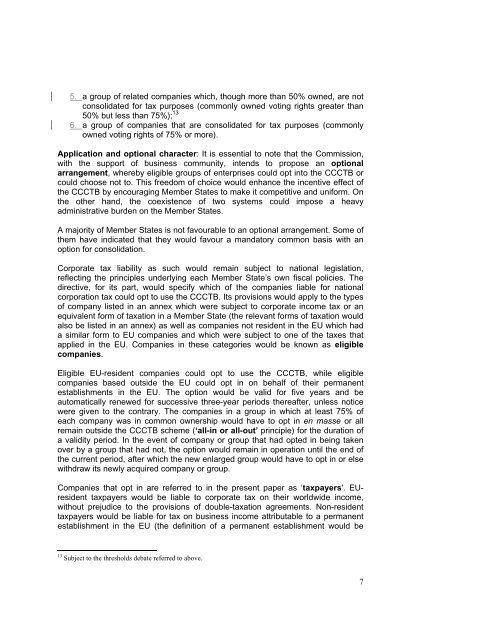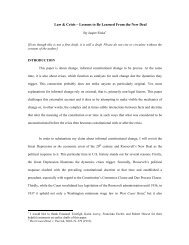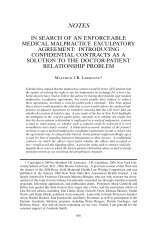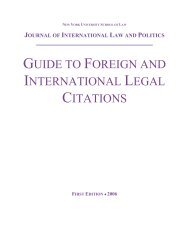An outline of the CCCTB (Common Consolidated Corporate Tax ...
An outline of the CCCTB (Common Consolidated Corporate Tax ...
An outline of the CCCTB (Common Consolidated Corporate Tax ...
You also want an ePaper? Increase the reach of your titles
YUMPU automatically turns print PDFs into web optimized ePapers that Google loves.
5. a group <strong>of</strong> related companies which, though more than 50% owned, are not<br />
consolidated for tax purposes (commonly owned voting rights greater than<br />
50% but less than 75%); 13<br />
6. a group <strong>of</strong> companies that are consolidated for tax purposes (commonly<br />
owned voting rights <strong>of</strong> 75% or more).<br />
Application and optional character: It is essential to note that <strong>the</strong> Commission,<br />
with <strong>the</strong> support <strong>of</strong> business community, intends to propose an optional<br />
arrangement, whereby eligible groups <strong>of</strong> enterprises could opt into <strong>the</strong> <strong>CCCTB</strong> or<br />
could choose not to. This freedom <strong>of</strong> choice would enhance <strong>the</strong> incentive effect <strong>of</strong><br />
<strong>the</strong> <strong>CCCTB</strong> by encouraging Member States to make it competitive and uniform. On<br />
<strong>the</strong> o<strong>the</strong>r hand, <strong>the</strong> coexistence <strong>of</strong> two systems could impose a heavy<br />
administrative burden on <strong>the</strong> Member States.<br />
A majority <strong>of</strong> Member States is not favourable to an optional arrangement. Some <strong>of</strong><br />
<strong>the</strong>m have indicated that <strong>the</strong>y would favour a mandatory common basis with an<br />
option for consolidation.<br />
<strong>Corporate</strong> tax liability as such would remain subject to national legislation,<br />
reflecting <strong>the</strong> principles underlying each Member State’s own fiscal policies. The<br />
directive, for its part, would specify which <strong>of</strong> <strong>the</strong> companies liable for national<br />
corporation tax could opt to use <strong>the</strong> <strong>CCCTB</strong>. Its provisions would apply to <strong>the</strong> types<br />
<strong>of</strong> company listed in an annex which were subject to corporate income tax or an<br />
equivalent form <strong>of</strong> taxation in a Member State (<strong>the</strong> relevant forms <strong>of</strong> taxation would<br />
also be listed in an annex) as well as companies not resident in <strong>the</strong> EU which had<br />
a similar form to EU companies and which were subject to one <strong>of</strong> <strong>the</strong> taxes that<br />
applied in <strong>the</strong> EU. Companies in <strong>the</strong>se categories would be known as eligible<br />
companies.<br />
Eligible EU-resident companies could opt to use <strong>the</strong> <strong>CCCTB</strong>, while eligible<br />
companies based outside <strong>the</strong> EU could opt in on behalf <strong>of</strong> <strong>the</strong>ir permanent<br />
establishments in <strong>the</strong> EU. The option would be valid for five years and be<br />
automatically renewed for successive three-year periods <strong>the</strong>reafter, unless notice<br />
were given to <strong>the</strong> contrary. The companies in a group in which at least 75% <strong>of</strong><br />
each company was in common ownership would have to opt in en masse or all<br />
remain outside <strong>the</strong> <strong>CCCTB</strong> scheme (‘all-in or all-out’ principle) for <strong>the</strong> duration <strong>of</strong><br />
a validity period. In <strong>the</strong> event <strong>of</strong> company or group that had opted in being taken<br />
over by a group that had not, <strong>the</strong> option would remain in operation until <strong>the</strong> end <strong>of</strong><br />
<strong>the</strong> current period, after which <strong>the</strong> new enlarged group would have to opt in or else<br />
withdraw its newly acquired company or group.<br />
Companies that opt in are referred to in <strong>the</strong> present paper as ‘taxpayers'. EUresident<br />
taxpayers would be liable to corporate tax on <strong>the</strong>ir worldwide income,<br />
without prejudice to <strong>the</strong> provisions <strong>of</strong> double-taxation agreements. Non-resident<br />
taxpayers would be liable for tax on business income attributable to a permanent<br />
establishment in <strong>the</strong> EU (<strong>the</strong> definition <strong>of</strong> a permanent establishment would be<br />
13 Subject to <strong>the</strong> thresholds debate referred to above.<br />
7
















